"Cherishing Little Steps - A Haven for Baby and Family Journeys"
Natural Skincare Solutions for Acne
When it comes to combating acne, the market offers a myriad of products laden with harsh chemicals that may do more harm than good to your skin. But what if we told you that there is a gentler, more effective approach that nature has to offer for your acne concerns? By exploring the realm of natural skincare solutions, you might discover a whole new way to nurture and heal your skin from within, without compromising on results.
Key Takeaways
- Use healing masks with Tea Tree Oil and Bentonite Clay for acne treatment.
- Incorporate calming ingredients like Aloe Vera Gel and Witch Hazel into your skincare routine.
- Nourish skin with moisturizers containing Aloe Vera Gel, Jojoba Oil, or Shea Butter.
- Spot treat acne with natural remedies like Tea Tree Oil, Aloe Vera Gel, or Witch Hazel.
- Maintain internal wellness through hydration, balanced diet, stress management, sleep, and supplements.
Understanding Acne Causes
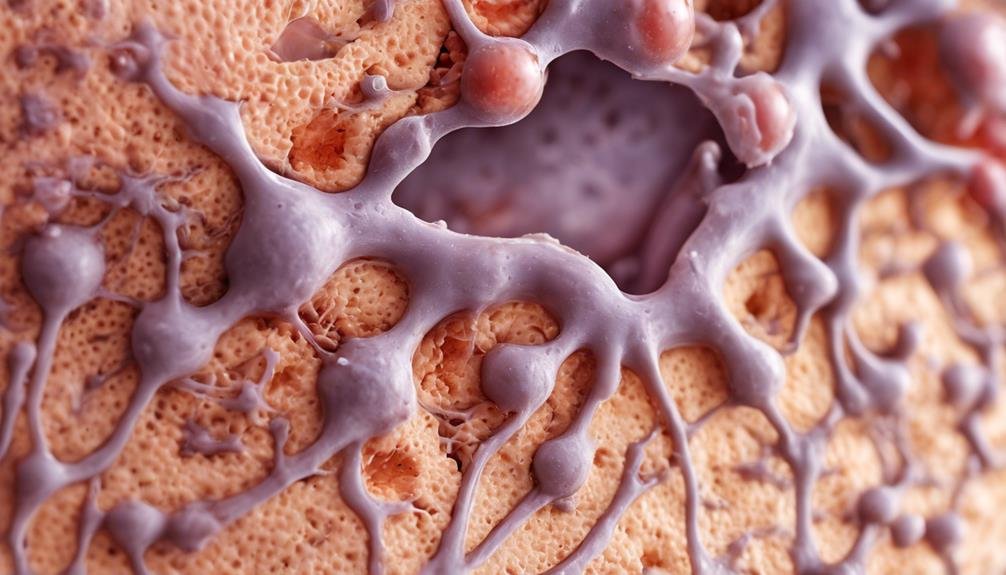
To effectively address acne, it's crucial to understand its root causes. Acne often occurs when hair follicles become clogged with oil and dead skin cells. This leads to the growth of bacteria, particularly Propionibacterium acnes, which can cause inflammation.
Hormonal changes, particularly during puberty, pregnancy, or due to certain medications, can increase oil production in the skin, exacerbating acne. Genetics also play a significant role; if your parents had acne, you're more likely to develop it too.
Diet may influence acne as well. Foods with a high glycemic index, such as sugary snacks and refined carbohydrates, can spike blood sugar levels, leading to increased oil production and inflammation in the skin.
Stress is another factor that can worsen acne due to the release of cortisol, a hormone that can trigger oil production.
Understanding these causes can help tailor your skincare routine and lifestyle choices to effectively manage and prevent acne breakouts.
Gentle Cleansing Techniques
When it comes to managing acne, adopting gentle cleansing techniques is essential for maintaining clear and healthy skin. Using a mild, non-abrasive cleanser formulated for acne-prone skin can help remove excess oil, dirt, and impurities without stripping the skin of its natural oils. It's important to cleanse your face twice a day, in the morning and evening, to prevent clogged pores and breakouts.
When cleansing your face, avoid using harsh scrubbing motions that can irritate the skin and exacerbate acne. Instead, gently massage the cleanser onto your skin using circular motions, then rinse thoroughly with lukewarm water.
Pat your skin dry with a soft towel, avoiding rubbing or pulling on the skin.
In addition to your regular cleansing routine, consider incorporating natural ingredients like tea tree oil or witch hazel, known for their antibacterial and soothing properties. These can help reduce inflammation and prevent future breakouts. Remember, consistency is key when it comes to skincare, so stick to your gentle cleansing routine to see improvements in your acne-prone skin.
Effective Exfoliation Methods
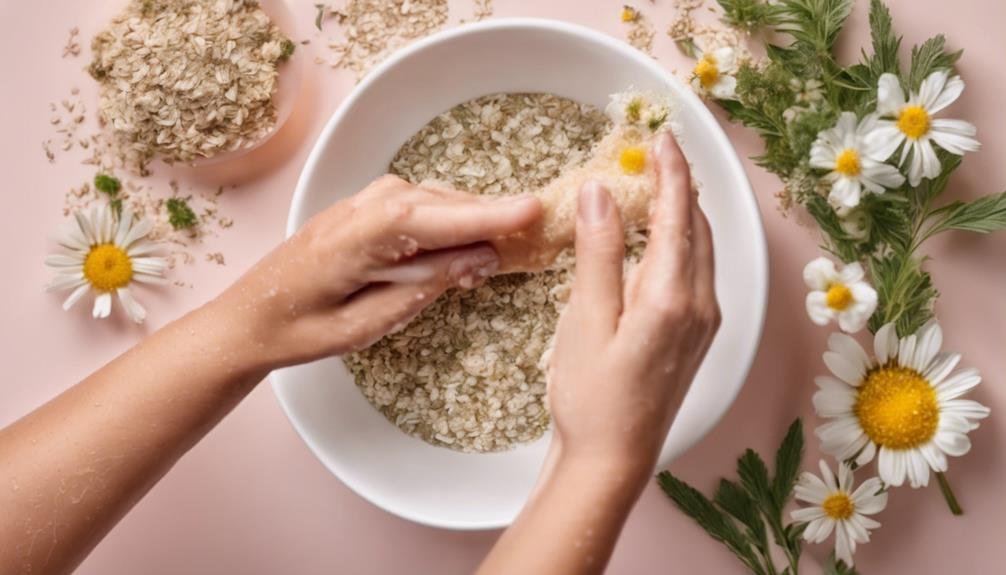
Utilizing effective exfoliation methods is crucial in maintaining clear and radiant skin, especially for individuals prone to acne. Exfoliation helps to remove dead skin cells, excess oil, and unclog pores, preventing breakouts and promoting a smoother complexion. When dealing with acne-prone skin, it's essential to choose gentle exfoliants to avoid irritation and inflammation. Opt for natural ingredients like oatmeal, sugar, or clay-based exfoliants, which are mild yet effective in sloughing off dead skin cells.
Physical exfoliation involves using tools like brushes or scrubs to manually remove impurities from the skin's surface. Be gentle and avoid harsh scrubbing motions that could damage the skin barrier.
Chemical exfoliation, on the other hand, involves using acids like salicylic acid or glycolic acid to dissolve dead skin cells and unclog pores. These acids are effective in treating acne by promoting cell turnover and preventing breakouts.
Incorporate exfoliation into your skincare routine 2-3 times a week to maintain clear and healthy skin, but be mindful not to over-exfoliate, as this can lead to dryness and irritation.
Healing Masks and Treatments
For effective acne management, incorporating healing masks and treatments into your skincare routine can provide targeted care for troubled skin. These specialized treatments can help reduce inflammation, unclog pores, and promote healing, contributing to clearer and healthier skin over time.
Here is a table outlining some natural ingredients commonly found in healing masks and treatments, along with their benefits for acne-prone skin:
| Ingredient | Benefits |
|---|---|
| Tea Tree Oil | Antimicrobial and anti-inflammatory properties |
| Bentonite Clay | Absorbs excess oil and toxins from the skin |
| Manuka Honey | Soothes and moisturizes irritated skin |
| Witch Hazel | Astringent properties to tighten pores |
Incorporating these ingredients into your skincare routine through masks or spot treatments can help target acne at the root, promoting clearer and healthier skin. Remember to patch test new products and consult with a dermatologist if you have sensitive skin or allergies.
Calming Aloe Vera Gel
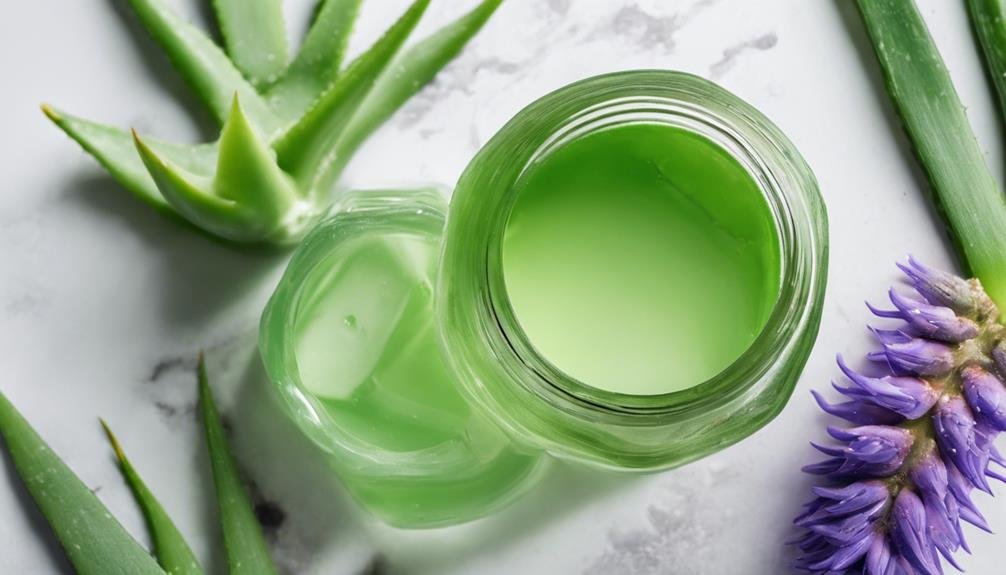
To enhance your acne management routine, consider incorporating Calming Aloe Vera Gel, a soothing and hydrating option known for its beneficial properties in skincare. Aloe vera is a natural plant extract that has been used for centuries for its healing properties.
When applied to the skin, aloe vera gel can help reduce inflammation, redness, and irritation associated with acne breakouts. Its moisturizing effects can also help keep the skin hydrated without clogging pores, making it suitable for all skin types, including oily and sensitive skin.
Aloe vera gel contains antioxidants, enzymes, and vitamins A and C, which can help promote healing and prevent scarring from acne. Its anti-inflammatory properties can calm irritated skin, reducing the appearance of acne lesions.
To use Calming Aloe Vera Gel, simply apply a thin layer to clean skin and allow it to absorb before applying other skincare products. Incorporating this natural remedy into your skincare routine can help soothe acne-prone skin and promote a clearer complexion.
Balancing Tea Tree Oil
Harness the power of Balancing Tea Tree Oil to address acne concerns effectively. Tea tree oil is known for its antibacterial and anti-inflammatory properties, making it a potent natural remedy for acne-prone skin. When applied topically, tea tree oil can help reduce the bacteria on the skin that contribute to acne breakouts. Its anti-inflammatory effects can also soothe redness and swelling associated with acne lesions.
To use tea tree oil for acne, mix a few drops with a carrier oil like coconut or jojoba oil to prevent skin irritation. Apply the mixture to the affected areas using a cotton swab or pad. It's important to do a patch test before applying tea tree oil to your face to ensure you don't have any adverse reactions.
Additionally, incorporating tea tree oil into your skincare routine can help balance oil production, unclog pores, and promote clearer skin over time. Remember to use tea tree oil in moderation, as excessive use can dry out the skin.
Soothing Lavender Infusions
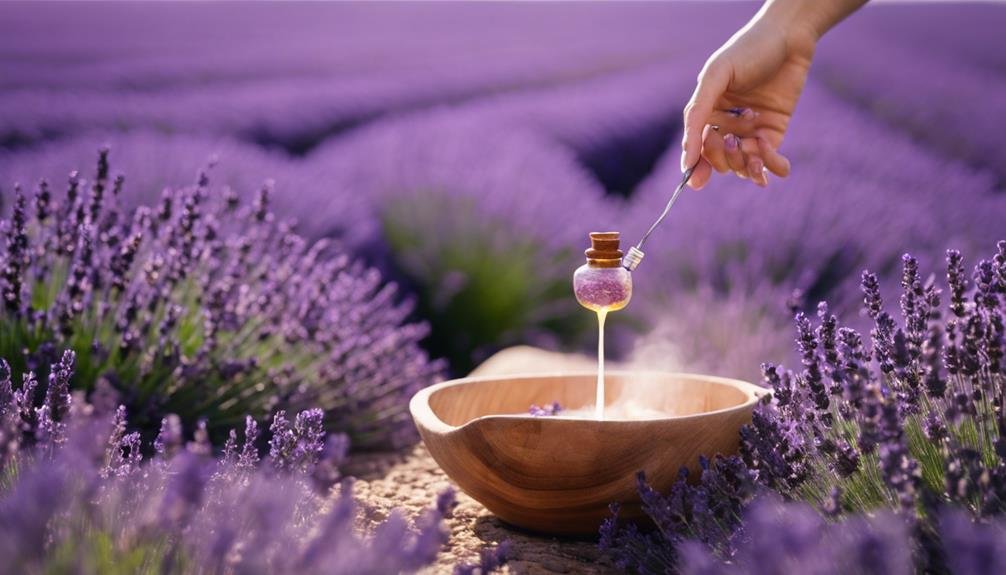
As you explore natural solutions for acne, consider the calming benefits of soothing Lavender infusions. Lavender, known for its gentle and calming properties, can be a valuable addition to your skincare routine when dealing with acne.
Lavender has natural anti-inflammatory and antibacterial properties that can help reduce redness and swelling associated with acne breakouts. Its soothing effects can also help alleviate stress, which is often linked to skin issues like acne. Incorporating Lavender infusions into your skincare regimen can provide a sense of relaxation while working to improve your skin's condition.
To create a Lavender infusion, you can steep dried Lavender flowers in hot water to make a calming tea. After the tea has cooled, you can use it as a gentle toner by applying it to your skin with a cotton pad.
Alternatively, you can add a few drops of Lavender essential oil to your favorite carrier oil to create a nourishing facial serum. By incorporating Lavender infusions into your skincare routine, you can harness the soothing benefits of this versatile herb to help manage acne more effectively.
Purifying Witch Hazel Toner
When seeking a potent solution to refine and purify your skin, consider incorporating a Witch Hazel toner into your skincare routine. Witch Hazel, derived from the bark and leaves of the Hamamelis virginiana plant, is renowned for its astringent properties. This natural ingredient helps to remove excess oil, tighten pores, and reduce inflammation, making it a valuable ally in the fight against acne.
Witch Hazel toners work by gently cleansing the skin and balancing its pH levels. The tannins present in Witch Hazel have antimicrobial properties that can help prevent acne-causing bacteria from thriving on your skin. Additionally, its anti-inflammatory effects can soothe redness and irritation, promoting a clearer complexion.
To use Witch Hazel toner effectively, simply apply it to a cotton pad and gently swipe it across your face after cleansing. Be sure to follow up with a hydrating moisturizer to maintain skin balance.
Nourishing DIY Moisturizers
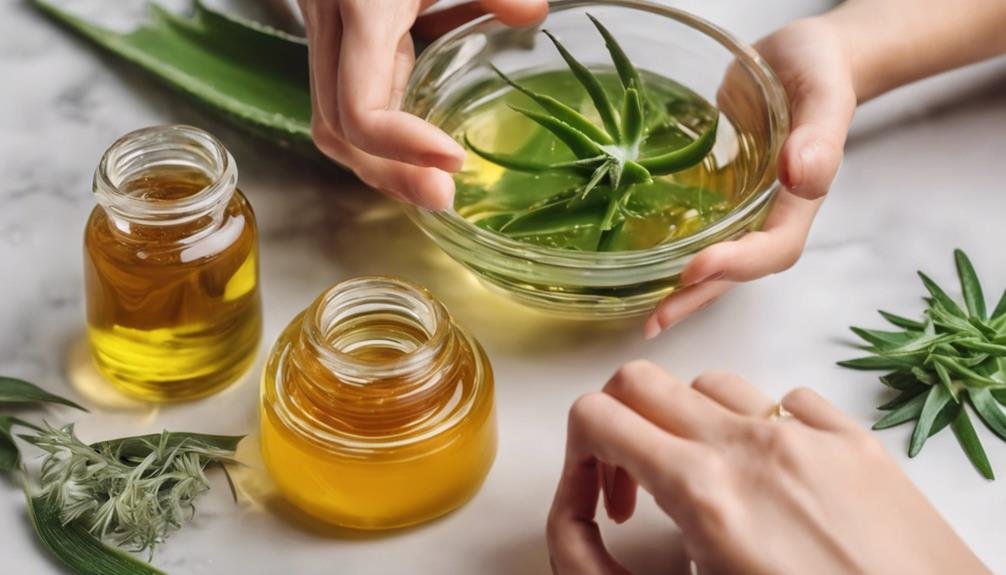
To enhance your skincare routine with nourishing DIY moisturizers, consider crafting personalized blends that cater to your skin's specific needs. Creating your own moisturizers allows you to control the ingredients, ensuring they are gentle and beneficial for acne-prone skin. Here is a simple guide to help you get started:
| Ingredient | Benefits | How to Use |
|---|---|---|
| Aloe Vera Gel | Soothes inflammation and hydrates skin | Apply a thin layer after cleansing |
| Jojoba Oil | Balances oil production and moisturizes | Mix a few drops with aloe vera gel |
| Tea Tree Essential Oil | Antibacterial properties | Add a drop to your moisturizer blend |
| Shea Butter | Nourishes and softens the skin | Incorporate into your nighttime routine |
| Lavender Essential Oil | Calms irritation and promotes healing | Mix with jojoba oil for added benefits |
Experiment with different ratios of these ingredients to find the perfect moisturizer for your skin. Remember to do a patch test before applying it to your face.
Spot Treatment Solutions
Looking to target pesky blemishes effectively? Spot treatment solutions can be a game-changer in your acne-fighting skincare routine. When dealing with those unwelcome breakouts, it's essential to choose natural and effective remedies that can help reduce inflammation and promote healing.
One potent spot treatment is tea tree oil. Known for its antibacterial and anti-inflammatory properties, tea tree oil can help combat acne-causing bacteria and reduce redness. Simply dilute a few drops of tea tree oil with a carrier oil like coconut oil and apply it directly to the blemish.
Another excellent option is aloe vera gel. Aloe vera has soothing and anti-inflammatory effects, making it ideal for calming irritated skin. Apply a small amount of pure aloe vera gel to the affected area to help reduce swelling and redness.
Lastly, consider using witch hazel as a spot treatment. Witch hazel possesses astringent properties that can help tighten pores and reduce inflammation. Dab a bit of witch hazel onto a cotton pad and gently apply it to the blemish for a refreshing and effective treatment.
Internal Wellness Tips

Spot treatment solutions play a significant role in addressing acne, but achieving clear and healthy skin goes beyond just topical remedies. Internal wellness tips are crucial for maintaining skin health from the inside out. Here are some essential recommendations for promoting internal wellness to combat acne:
- Stay Hydrated: Drinking an adequate amount of water helps flush out toxins and keeps your skin hydrated.
- Eat a Balanced Diet: Incorporate fruits, vegetables, lean proteins, and whole grains to provide your skin with essential nutrients.
- Manage Stress: High-stress levels can exacerbate acne, so practice relaxation techniques like yoga or meditation.
- Get Sufficient Sleep: Lack of sleep can lead to hormonal imbalances, which may contribute to acne breakouts.
- Consider Supplements: Some supplements like zinc, probiotics, and omega-3 fatty acids have been linked to improved skin health.
Holistic Skincare Routine
Regularly incorporating a holistic skincare routine into your daily regimen can significantly impact the health and appearance of your skin. A holistic approach to skincare involves addressing not just the external symptoms of acne but also the underlying causes.
Start your day with a gentle cleanser containing natural ingredients like tea tree oil or witch hazel to cleanse your skin without stripping it of essential oils. Follow up with a natural toner to balance your skin's pH levels and reduce inflammation. Incorporate a nourishing moisturizer with ingredients like aloe vera or jojoba oil to hydrate and soothe your skin. Throughout the day, remember to drink plenty of water to keep your skin hydrated from the inside out.
In the evening, practice gentle cleansing and follow up with a calming serum or spot treatment containing ingredients like chamomile or calendula to reduce redness and promote healing. Finally, establish a regular bedtime routine to ensure you get enough rest, as lack of sleep can contribute to acne flare-ups.
Frequently Asked Questions
Can Diet and Nutrition Affect Acne Breakouts?
Yes, diet and nutrition can impact acne breakouts. Consuming high glycemic foods, dairy, and certain fats may worsen acne. Opt for a balanced diet rich in fruits, vegetables, whole grains, and lean proteins to support clearer skin.
How Can Stress Impact Acne Flare-Ups?
Stress can trigger hormonal changes that lead to increased oil production, clogged pores, and inflammation, exacerbating acne flare-ups. Managing stress through techniques like mindfulness, exercise, and self-care can help reduce the impact on your skin.
Is It Safe to Mix Natural Skincare Ingredients?
When mixing natural skincare ingredients, it's generally safe. However, always do a patch test to check for any adverse reactions. Be cautious with potent essential oils and acidic substances. Consult a dermatologist if unsure.
Can Hormonal Changes Worsen Acne?
Hormonal changes can indeed worsen acne by increasing oil production and inflammation in your skin. It's common during puberty, menstrual cycles, pregnancy, or menopause. Consulting a dermatologist can help pinpoint the underlying cause for effective treatment.
What Role Does Sleep Play in Managing Acne?
In managing acne, sleep is crucial. Lack of sleep can increase stress hormones, leading to inflammation and worsening breakouts. Adequate rest supports skin repair and balances hormones, promoting clearer skin. Prioritize quality sleep for healthier skin.
Conclusion
In conclusion, natural skincare solutions for acne offer a holistic approach to combat breakouts and promote skin health. By incorporating gentle cleansing techniques, effective exfoliation methods, healing masks, and nourishing moisturizers, you can create a skincare routine that addresses acne concerns in a gentle and effective manner. Remember, "An ounce of prevention is worth a pound of cure." Take care of your skin naturally to achieve lasting results.




